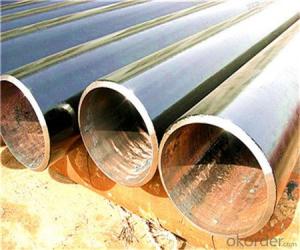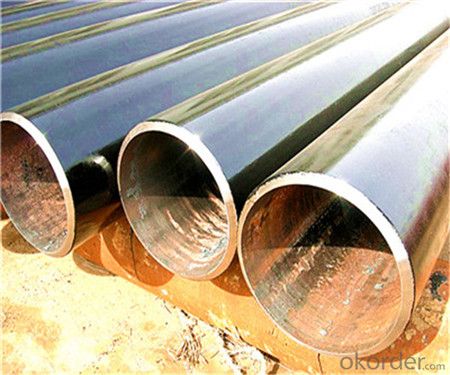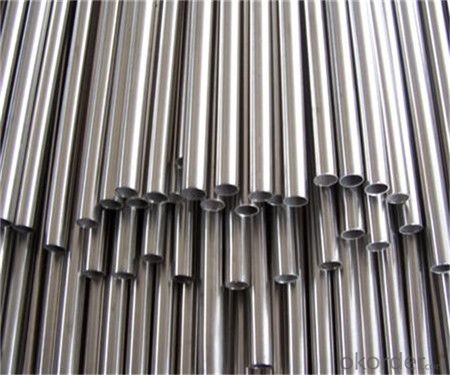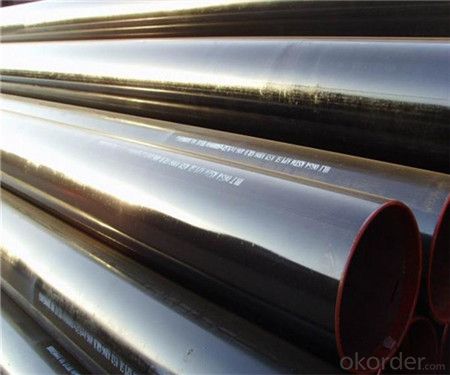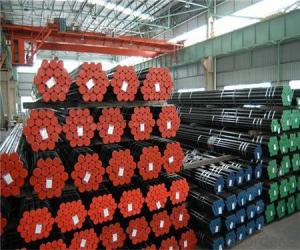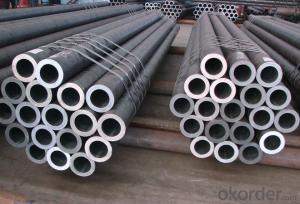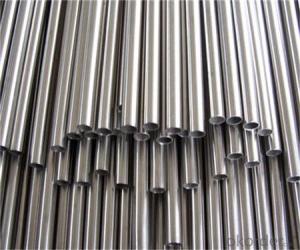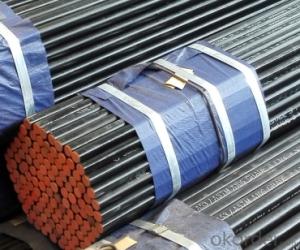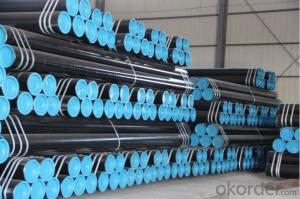Seamless Steel Pipe with API 5L-0733/A106/A53 Standard
- Loading Port:
- Tianjin
- Payment Terms:
- TT OR LC
- Min Order Qty:
- 25 m.t.
- Supply Capability:
- 200000 m.t./month
OKorder Service Pledge
OKorder Financial Service
You Might Also Like
1、Structure of API 5L-0733/A106/A53 Pipe:
Seamless pipe is formed by drawing a solid billet over a piercing rod to create the hollow shell. As the manufacturing process does not include any welding, seamless pipes are perceived to be stronger and more reliable. Historically seamless pipe was regarded as withstanding pressure better than other types, and was often more easily available than welded pipe.
2、API 5L-0733/A106/A53 Pipe Specification:
Standard | GB, DIN, ASTM ASTM A106-2006, ASTM A53-2007 |
Grade | 10#-45#, 16Mn 10#, 20#, 45#, 16Mn |
Thickness | 8 - 33 mm |
Section Shape | Round |
Outer Diameter | 133 - 219 mm |
Place of Origin | Shandong, China (Mainland) |
Secondary Or Not | Non-secondary |
Application | Hydraulic Pipe |
Technique | Cold Drawn |
Certification | API |
Surface Treatment | factory state or painted black |
Special Pipe | API Pipe |
Alloy Or Not | Non-alloy |
Length | 5-12M |
Outer Diameter | 21.3-610mm |
Grade | 20#, 45#, Q345, API J55, API K55, API L80, API N80, API P110, A53B |
Standard | ASME, ASTM |
1) Material:20#(ASTM A 106/A53 GRB.API5LGRB,GB),45#,16Mn,10#.
2) Specification range:OD:21.3-610mm,WT:6-70mm,length:6-12m or according to the requirement of clients.
3) Excutive standards:GB,ASME API5L.ASTM A 106/A53,Despite of the above standards,we can also supply seamless steel pipe with standard of DIN,JIS,and so on,and also develop new products according to the requirements of our clients!
4) Surface:black lacquered,varnish coating or galvanized.
5) Ends:Beveled or square cut,plastic capped,painted.
6) Packing:bundles wrapped with strong steel strip,seaworthy packing.
3、Main Features of API 5L-0733/A106/A53 Pipe::
• High manufacturing accuracy
• High strength
• Small inertia resistance
• Strong heat dissipation ability
• Good visual effect
• Reasonable price
4、Packaging & Delivery
Packaging Details: | seaworthy package,bundles wrapped with strong steel strip |
Delivery Detail: | 15-30days after received 30%TT |
5、FAQ of API 5L-0733/A106/A53 Pipe::
①How is the quality of your products?
Our products are manufactured strictly according to national and internaional standard, and we take a test
on every pipe before delivered out. If you want see our quality certifications and all kinds of testing report, please just ask us for it.
Guaranteed: If products’ quality don’t accord to discription as we give or the promise before you place order, we promise 100% refund.
②How about price?
Yes, we are factory and be able to give you lowest price below market one, and we have a policy that “ for saving time and absolutely honest business attitude, we quote as lowest as possible for any customer, and discount can be given according to quantity”,if you like bargain and factory price is not low enough as you think, just don’t waste your time.Please trust the quotation we would give you, it is professional one.
③Why should you chose us?
Chose happens because of quality, then price, We can give you both.Additionally, we can also offer professional products inquiry, products knowledge train(for agents), smooth goods delivery, exellent customer solution proposals.Our service formula: good quality+good price+good service=customer’s trust
SGS test is available, customer inspection before shipping is welcome, third party inspection is no problem.
6、API 5L-0733/A106/A53 Pipe Images:
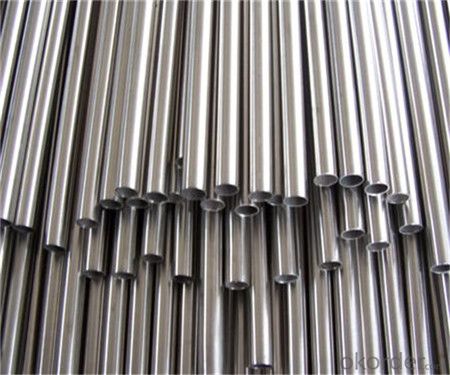
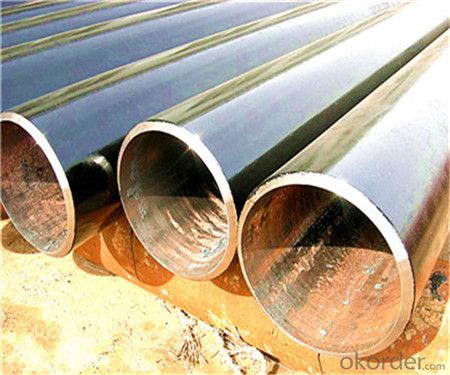
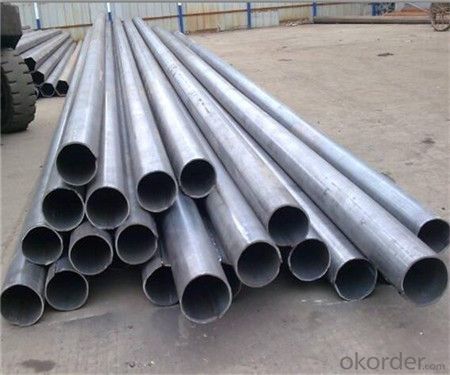
- Q: What are the different types of steel coatings used for pipes?
- There are several types of steel coatings used for pipes, including epoxy, polyethylene, polypropylene, and fusion bonded epoxy (FBE) coatings. Each of these coatings provides different levels of corrosion resistance and protection, making them suitable for various applications and environmental conditions.
- Q: How are steel pipes used in the manufacturing sector?
- Steel pipes are widely used in the manufacturing sector for various purposes such as transporting fluids, gases, and solid materials, as well as providing structural support in buildings and machinery. They are commonly used in industries like oil and gas, construction, automotive, and manufacturing plants for their durability, strength, and resistance to corrosion. Steel pipes enable efficient and reliable transportation of materials, facilitating the manufacturing process and ensuring the smooth operation of industrial systems.
- Q: What is the standard length of steel pipes?
- The standard length of steel pipes can vary depending on the application and industry, but commonly they are available in lengths of 20 feet or 6 meters.
- Q: What is the difference between steel pipe and PVC pipe?
- Both steel pipe and PVC pipe are commonly utilized materials for plumbing and other construction purposes; however, they possess several distinct dissimilarities. To begin with, the materials themselves differ. Steel pipe is manufactured from a blend of iron and carbon, known as steel. This material is renowned for its robustness and durability, rendering it appropriate for high-pressure applications and subterranean installations. Conversely, PVC (polyvinyl chloride) pipe is crafted from a type of plastic called PVC. PVC pipe is characterized by its lightweight nature, flexibility, and ease of handling, making it a favored choice for residential plumbing and irrigation systems. Next, the installation process varies. Steel pipe necessitates skilled labor and specialized tools for cutting, threading, and welding. It frequently involves a complex installation procedure, particularly for larger pipe sizes. Conversely, PVC pipe can be effortlessly cut with a saw or specialized pipe cutter and joined together utilizing solvent cement or threaded fittings. This renders PVC pipe more suitable for DIY projects and simpler installations. Moreover, steel pipe incurs greater costs compared to PVC pipe. Steel is a pricier material, and the manufacturing process for steel pipe is more intricate, entailing multiple steps and additional materials. PVC pipe, as a plastic-based material, is generally less expensive and more cost-effective, particularly for smaller diameter applications. In terms of performance, steel pipe possesses greater tensile strength, can endure higher levels of pressure, and exhibits greater resistance to temperature fluctuations, rendering it ideal for heavy-duty and industrial applications. Conversely, PVC pipe possesses lower tensile strength but is resistant to corrosion, chemicals, and scale buildup. PVC pipe is commonly employed in residential plumbing, irrigation systems, and other non-industrial applications. To summarize, the primary disparities between steel pipe and PVC pipe revolve around the materials used, installation processes, costs, and performance characteristics. While steel pipe is sturdier and more suitable for heavy-duty applications, PVC pipe is lighter, easier to install, and more cost-effective for residential and non-industrial purposes.
- Q: Can steel pipes be used for food processing facilities?
- Steel pipes are indeed applicable for food processing facilities. These pipes are frequently utilized in such facilities because of their impressive robustness, strength, and ability to resist corrosion. Moreover, they can be easily cleaned, a crucial factor in maintaining the required hygiene standards in food processing environments. Furthermore, steel pipes are capable of withstanding high temperatures and pressure, rendering them suitable for a wide range of food processing applications, including the transportation of liquids, gases, and solids. Nevertheless, it is imperative to guarantee that the steel pipes employed in food processing facilities are constructed from materials that have received approval for food contact. Additionally, regular inspections and maintenance must be carried out to prevent any potential risks of contamination.
- Q: Can steel pipes be used for wastewater treatment facilities?
- Yes, steel pipes can be used for wastewater treatment facilities. Steel pipes are commonly used in wastewater treatment plants due to their durability, strength, and resistance to corrosion. They can efficiently transport and distribute wastewater throughout the facility, ensuring its proper treatment and disposal. Additionally, steel pipes can withstand the harsh conditions and chemicals often present in wastewater treatment processes, making them a reliable choice for this application.
- Q: How are steel pipes classified based on pressure ratings?
- Steel pipes are classified based on pressure ratings into different categories such as schedule numbers or pressure classes, which indicate their ability to withstand different levels of pressure.
- Q: What are the disadvantages of using steel pipes?
- One major disadvantage of using steel pipes is their susceptibility to corrosion. Over time, exposure to moisture and certain chemicals can cause the pipes to rust and weaken, leading to leaks or structural damage. Additionally, steel pipes are generally heavier and more expensive than alternative materials, making them less suitable for certain applications where weight and cost are crucial factors.
- Q: How are steel pipes marked for identification?
- Pipe marking is a process used to identify steel pipes. This process involves placing labels or markers on the pipes' surface to provide important information about their specifications and characteristics. The labels typically include details such as the size, grade, material composition, manufacturer's logo or name, and any relevant codes or standards. These markings are crucial for proper identification and ensure that the right pipes are used for specific applications, as well as for maintenance and repair purposes. Furthermore, the markings also assist with quality control and traceability, making it easy to identify and track the pipes throughout their lifespan. In summary, using clear and durable marking systems to identify steel pipes is vital for safety, efficiency, and compliance in various industries where these pipes are used.
- Q: Are steel pipes resistant to fire?
- Yes, steel pipes are highly resistant to fire.
Send your message to us
Seamless Steel Pipe with API 5L-0733/A106/A53 Standard
- Loading Port:
- Tianjin
- Payment Terms:
- TT OR LC
- Min Order Qty:
- 25 m.t.
- Supply Capability:
- 200000 m.t./month
OKorder Service Pledge
OKorder Financial Service
Similar products
Hot products
Hot Searches
Related keywords
